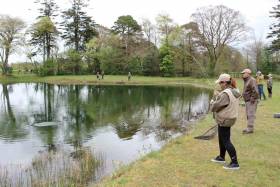Displaying items by tag: Mount Falcon
#Angling - Breast cancer survivors gathered at Mount Falcon in Ballina last weekend for a angling retreat organised by Casting For Recovery and supported by Inland Fisheries Ireland (IFI).
Thirteen women from Belfast, Cork, Dublin, Fermanagh, Galway, Mayo and Cambridge in the UK attended the free fishing retreat which incorporated medical advice, education services, counselling and relaxation techniques.
The retreat was delivered by trained professionals including a psycho-social therapist, a health care professional as well as qualified fly fishing instructors and fishing guides.
Casting for Recovery UK & Ireland is a flagship project of The Countryside Alliance Foundation, a charity dedicated to increasing access to the countryside and helping as many people appreciate the great outdoors in the UK and Ireland.
Casting for Recovery provides an opportunity for women who have gone through a breast cancer journey to attend a retreat at a spectacular venue to learn the art of fly fishing.
This was the eighth year which the initiative has been held at Mount Falcon, with participants receiving fly fishing coaching and advice from local volunteers.
Many previous participants have taken up fly fishing as a hobby, with one even graduating to fish on the Irish Women’s Team – selections for which have begun ahead of the 2018 Home Internationals, according to The Irish Times.
The event was supported by IFI’s Sponsorship Scheme for angling events and initiatives across the country.
As previously reported on Afloat.ie, the scheme will support 79 initiatives in 2017 to the overall tune of €30,000, with a focus on those which help grow Ireland’s angling tourism product and support novice anglers.
In other angling news, the Irish Federation of Sea Anglers has announced its junior and youth teams to represent Ireland at this year’s Junior Shore Angling Worlds on the Cote d’Opale in Northern France, as the Belfast Telegraph reports.





























































